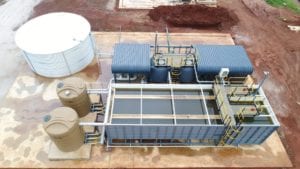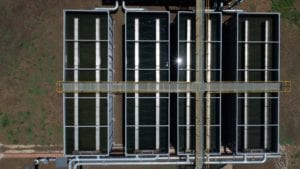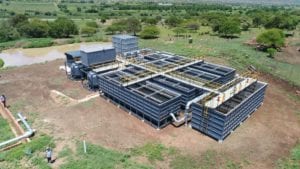With three of South Africa’s provinces having been declared drought disaster regions, the country as a whole faces a long-term water security challenge. Modular water treatment plants may provide an answer.
South Africa’s urban areas generally experience water services of a high standard. However, water supply remains a challenge in many rural areas that are without formalised infrastructure.
Given South Africa’s needs, Johan Bieseman, managing director, AquaPlan, believes that modular treatment plants offer a cost- and time-effective solution. His company recently installed a 10 MLD modular plant in Msinga in rural KwaZulu-Natal. The skid-mounted packaged plant will treat surface water for up to 200 000 residents over the next 20 years.
According to Johan, AquaPlan was engaged to supply the plant due to the ease of deployment and delivery speed of its modular solution. The project took only eight months – six months to build the package plant off-site and a further two months to install. Civil works on-site took only eight weeks and ran in parallel with the manufacturing process.
The 10 MLD plant consists of 12 modular skids over a 20 m x 30 m area. The 3.6 m x 12 m skids are all pre-manufactured and integrated on a complete 3D model before installation.
Although modular, this is a standard water treatment plant. Unit operations include river abstraction, coagulation, flocculation, clarification, sand filtration, disinfection, and high-pressure pumping into the
distribution network. According to Johan, the plant is easy to operate and comes with semi-automated controls, integrated PLC, full electrical and instrumentation wiring and easy start-up. AquaPlan is currently entering the commissioning phase and will soon hand over the plant to be operated by the district municipality using operational staff sourced from the local community. “We’re excited about the possibilities these modular plants offer and, given South Africa’s water situation, it is clear that the country needs many plants like these and there will be pressure on government to roll them out,” Johan concludes.
 Quick, easy deployment
Quick, easy deployment
According to Johan, AquaPlan was engaged to supply the plant due to the ease of deployment and delivery speed of its modular solution. The project took only eight months – six months to build the package plant off-site and a further two months to install. Civil works on-site took only eight weeks and ran in parallel with the manufacturing process.
The 10 MLD plant consists of 12 modular skids over a 20 m x 30 m area. The 3.6 m x 12 m skids are all pre-manufactured and integrated on a complete 3D model before installation.“This is a top-end package plant and the quick-and-easy deployment makes this a very cost-effective solution for municipalities,” says Johan. He compares it to a conventional 6 MLD civil structured water treatment plant AquaPlan built in Molepo, Limpopo. The conventional plant required 50% more capital and 100% more installation time compared to the modular plant.
“This begs the question: why would you opt for a conventional plant over the modular solution?” asks Johan. Simple operation
Simple operation
Although modular, this is a standard water treatment plant. Unit operations include river abstraction, coagulation, flocculation, clarification, sand filtration, disinfection, and high-pressure pumping into thedistribution network. According to Johan, the plant is easy to operate and comes with semi-automated controls, integrated PLC, full electrical and instrumentation wiring and easy start-up. AquaPlan is currently entering the commissioning phase and will soon hand over the plant to be operated by the district municipality using operational staff sourced from the local community. “We’re excited about the possibilities these modular plants offer and, given South Africa’s water situation, it is clear that the country needs many plants like these and there will be pressure on government to roll them out,” Johan concludes.







